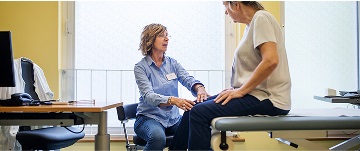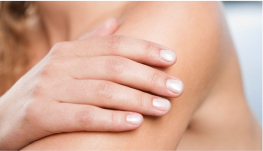Cancer
Understand different cancers and get support if you or someone close has a diagnosis. Plus, find information on common symptoms and treatment.
How can we help you?
Cancer: your questions answered
Transcript
Who are you?
Hi, I am Rita Trewartha
and I'm head of clinical services for Bupa UK Insurance.
I'm a nurse with over 40 years
experience, come and ask me about cancer.
What is cancer?
Cancer is essentially a group of abnormal cells.
So it starts in the cells in our bodies.
I try to explain it
that the cells are like tiny little building blocks
that make up our organs and tissues throughout our bodies
and for them to grow and divide
they get signals to do that.
And those signals also tell them when to stop growing
and dividing and to die because they're no use anymore.
But sometimes also those signals can go wrong
and the cell becomes abnormal.
And those abnormal cells may also keep dividing
and dividing more
and developing into essentially forming a lump.
Now, often you'll hear lumps referred to as tumours.
Now tumours aren't necessarily cancers, not all lumps,
not all tumours are cancers.
The way that we find out the difference is
by taking a biopsy or a small sample of cells from that lump
or that tumour to determine
what it's made up of, essentially.
So the tumour or the lump might not be cancer,
and that would be called a benign tumour.
It can still grow, but it doesn't spread anywhere else in
the body and it only causes problems
and needs treatment if it's pressing on a structure
or something nearby, a muscle or an organ.
If it's not doing that, it will live there quite happily
and not cause any harm whatsoever.
A tumour that is cancer is called a malignant tumour,
and that can grow into nearby tissues,
and that is called a primary cancer site.
But also what it can do is travel to other parts
of the body, and it can do that through the blood
or the lymphatic system in the body.
And if it does that,
then it can settle deposits elsewhere in the body,
which can form other lumps or tumours that can grow.
And that's called a metastatic cancer.
So a secondary cancer to the primary site,
but all part of the same cancer really.
I suppose the other thing to also mention is
that cancer can form in the blood cells or the bone marrow,
and that develops into what we call
as a group blood cancers.
So one of those that you might have heard
of quite frequently is leukaemia.
So in essence,
actually cancer is a group of abnormal cells.
How common is cancer?
So one in two of us will be diagnosed
with cancer in our lifetimes with the highest lifetime risk
for females being for breast, lung, and bowel cancer
and for males being prostate, lung, and bowel cancer.
And we have seen an increase over recent years in cases
that are being identified, but that's
because we are much more aware now of the risks
and we are being screened more regularly
through our national programmes.
So we are catching cancers much earlier.
For the 10 most common cancer types, more than 70% with
of those cases in the UK have been attributable
to known risk factors, and that includes lung
and melanoma, skin cancer, which are 2
of the 5 most common cancer types in the UK.
What can cause cancer?
When we think about causes of cancer,
we can't really just think about one thing.
I think it's really important to understand
that right at the outset.
So it could be, for example,
that there's been an inherited cancer gene variant.
So that's something a person inherits from a parent.
Now that doesn't mean you've got cancer,
it doesn't guarantee you are going to get cancer,
but it might mean that if you had some abnormal cancer cells
that would develop more rapidly than it would
for somebody without that gene variant.
And if that gene variant was common within a family,
as in more than one person in that family,
or several people had that gene variant in that family,
that could mean a certain type of cancer was more common in
that family than you would see somewhere else in
the larger population.
And I suppose we always need to throw in age as something
that is an increase in risk in terms of cancer.
But when we are thinking about that inherited gene variant,
it's really important to understand
that it's less than 5% to 10%.
So that's less than 5 to 10 people in every 100
that will actually carry that gene variant.
So lifestyle factors such as smoking, being overweight
or obese, drinking alcohol above recommended levels,
over exposure to UV radiation from the sun,
those are the things that are much more likely
to influence you or me on a day-to-day basis.
How do I know if I am at risk of cancer?
So a person's risk of developing cancer depends on lots
of different factors, including age, genetics,
and external risk factors.
So those more associated with lifestyle.
Understanding your risk means, for example,
understanding if there is any family history,
but also what those external risk factors are
and actually how they apply to your life.
So as we know, smoking and overweight
and obesity are the primary preventable risk factors,
and 35% of all cancers
that's about 135,000 cases every year are preventable.
So you can start to better understand your risk.
I think other things that help us understand risk include,
for example, that lung, breast, bowel,
and melanoma skin cancers account for almost two thirds
of preventable cancer cases in the uk. Over exposure to UV,
so the sunshine
and substances at work, drinking alcohol to excess,
and too little dietary fibre.
Each of those could be responsible for 3% to 4%
of cancer cases in the UK.
And then there's some lesser known exposure risks.
So ionising radiation, x-rays,
or eating processed food that can account for about 1%
to 2% of cases.
And then even smaller than that, air pollution
or doing too little physical activity
could cause about 1% of cancers in the UK.
What are the main forms of cancer?
Currently in the UK, more than half
of new cancer cases in males is prostate,
lung, or bowel cancer.
And in females, half of new cases are either breast,
lung, or bowel cancer.
Can cancer be prevented?
So research shows that 35% approximately
of cancers are preventable.
And we know that smoking is the largest single preventable
cause of cancer in the UK each year,
and that's according to Cancer Research UK.
And we also know that being overweight
or obese is the second highest preventable cause of cancer.
So these are what I would refer to
as modifiable risk factors.
So something we can try to influence or do something about.
Not always easy, it doesn't mean we can't try.
So stopping smoking, maintaining
or achieving a healthy weight through diet
and exercise, following the recommended alcohol intake
guidelines and protecting ourselves from those potentially
harmful UV rays
by simple things using sunscreen and covering up.
So there's lots that we can do to contribute
to the prevention of cancer.
What percentage of cancers are preventable?
According to Cancer Research UK, over 35%
of cancers are preventable.
There's been a lot of research on this
and the World Health Organisation estimate that figure is
between 30% and 50% worldwide.
The main point to remember is managing your risk factors
and watching for changes in your body or any symptoms.
Can vaccines help to prevent cancer?
So there's an awful lot of research going on in this area
at the moment that's looking really, really positive.
But one development that there has been is the vaccine
for HPV, that's the human papilloma virus
that was identified a number of years ago as certain strains
of it being responsible for a significant amount
of cervical cancers in women.
The HPV vaccine has now been rolled out as part
of a school's programme to 11 and 13 year olds,
and that has had a significant impact in terms
of the prevention of cervical cancer.
Does genetic testing help to prevent cancer?
No, but it can help to identify if you are at greater risk
of developing cancer.
Genetic testing is a really complex area
and the results can sometimes be very
difficult to interpret.
I think I would always recommend getting some advice
before getting any testing,
and then use that healthcare professional advice
to help you interpret the results.
Does the risk of cancer increase as you age?
Sadly, yes, but it's still important
to keep a healthy lifestyle.
Half of cancers in the UK are prevalent
in the over seventies.
It doesn't mean that you will get cancer, so
therefore it's still important
to manage those lifestyle risk factors,
and also important to access any screening
that you are eligible for,
and also seek health professional advice if you've got any
symptoms at all.
How can I protect myself against cancer?
So firstly, make sure
that you access your cancer screening programmes
as you become eligible
or any other routine health checks that are available
to you, either through your GP surgery
or possibly even through work.
But most importantly,
protecting yourself is about understanding
what the risks are and checking if there is anything in your
lifestyle that you can do to modify those risks.
We know, for example, smoking and being overweight
or obese are the leading risk factors,
and 1 in 20 cancer cases are caused
by being overweight or obese.
And that research identifies approximately 35 million people
in the country at the moment are overweight or obese.
Now, that's measured on the body mass index scale,
and A BMI of over 25 is considered overweight or obese.
So that's something easy that you can check.
So depending on your circumstances, there could be lots
of things that you can do to reduce your risk
of getting cancer.
Can I get cancer more than once?
Sadly, yes, it could be a recurrence
or it could be something new.
Follow-ups are important
and recurrent cancer starts with cancer cells
that the first treatment didn't fully remove or destroy.
Now, this doesn't mean
that the treatment you received was wrong.
It just means that a small number of cancer cells
survived the treatment and were too small
to show up in follow-up tests over time.
These then grew into tumours
or cancer that your doctor can now detect.
Sometimes a new type
of cancer will occur in people
who've had a history of cancer.
When this happens, the new cancer is known
as a second primary cancer,
and the second primary cancer is different
from a recurrent cancer.
A recurrent cancer can be localised,
so literally in the same place as the original cancer,
or it can be regional,
and that means it's grown into lymph nodes
and tissues near to the original cancer.
Or it can be a distant recurrence,
and this means that the cancer has spread to organs
or tissues far from the original cancer.
It's called metastatic cancer or metastases.
I've had cancer before can I prevent it reoccurring?
You can minimise the risk of recurrence.
So if you are on ongoing treatment
because you're in remission, sticking to that treatment
and having your regular follow-ups
is really, really important.
If you are completely in remission,
but you have lifestyle factors that might pose a risk.
So overweight
and obesity, exposure to UV radiation, sunshine,
it's about managing the risk factors associated
with a recurrence of cancer.
What are the most common misconceptions about cancer?
So I think the most common one is that it won't happen
to me or my family because there's no history,
but I think we all know somebody
that's probably been affected, so that just isn't true.
And then there's other myths around mobile phones
and the non-ionising radiation from those and burnt foods
and eating burnt foods.
Again, there's definitely no known link at this moment in
time in relation to cancer, plastic containers
and bottles drinking from them,
putting your food in plastic bags.
There's no evidence that increases your risk of cancer.
The same in relation to artificial sweeteners
and the same in relation to stress and pesticides
and genetically modified food.
None of those things have an increased link to cancer.
How can I check whether I have any cancer symptoms?
If you know what's normal for you, it's much easier
to notice anything that changes. So instead
of regular self checks doing the same thing the same
time on a regular basis.
Just be aware of what's normal for you
and listen to your body,
and if something doesn't feel right, then you need to go
and get that checked from a health professional.
Go and speak to someone.
Listen to your body and speak to that health professional
because we know if you spot cancer at an early stage,
that does save lives.
Now a lot of people do talk about those regular checks,
but there's no evidence that that really helps.
So think about if we are talking about bowel cancer,
for example, changes in that bowel habit.
How often you go to the toilet can be an indicator
and a symptom, but it's normal for you.
So if you normally go to the toilet twice a day
and everything's the same as normal,
then you don't need to speak to anyone.
But if you start going much, much more regularly
or you can't go at all,
or the consistency is different, then that's the time to go
and get some advice.
We try not to be too prescriptive of
how long those symptoms should be there
before you seek advice,
because what's normal for you
isn't necessarily normal for me.
So listen to what your body's telling you
and get that professional advice, even if it's only
to put your mind at rest.
What symptoms should I look out for?
So there are lots and lots of different types of cancers,
which means there's lots
and lots of different types of symptoms.
So it's really not easy to give a list
and not all of those might resonate with you
or ring true for you anyway.
So some symptoms are going to be really obvious.
You are going to have a lump somewhere
that you haven't had before.
You can see a mole that's changed and is different,
but other symptoms might be more vague than that.
So you might be off your food, you might have lost weight
when you're not trying to lose weight,
you might be tired all the time and not know why that is.
There might not be a really good rationale for that.
So it really is very much about you feeling
or seeing something different for you, or as a friend
or family member, notice something different.
Then go and get that checked out with a health professional.
What can I do if I think I have cancer symptoms?
So the first thing for me is be brave and speak up.
As soon as you can. Go and see a healthcare professional.
If you've had symptoms, write it down so that you know
what you're saying to the GP.
If you can take a friend with you to help you remember,
if nothing else, whatever the doctor says to you,
that's really, really helpful
because you'll come out of that appointment
and you'll have forgotten everything
that anybody's said to you.
So fundamentally, the really, really important thing
that you really must do is if you think you've got symptoms,
go and get it checked out.
When should I seek professional advice about cancer?
Trust your instinct.
If something isn't normal for you,
if you think you've got symptoms, please go
and seek some professional advice.
If you're a Bupa customer, we have our direct acts
to cancer service so that you can phone us up
and we can give you a direct referral
to a consultant without consulting a gp,
or you can see a GP through our digital GP service,
and we also have our 24 hour Anytime Healthline manned
by nurses 24 hours a day, seven days a week.
Also, if you're invited to NHS screening appointments such
as mammogram or bowel cancer screening,
or for testicular checks,
please make sure you keep those appointments.
And do remember, just
because you've been screened, that doesn't mean
that you don't need
to get checked if you develop new symptoms in
between those screening times.
So if you get any new symptoms, even between your screening,
please also go and get those checked.
What should I do before going to the GP?
So gather your information,
get some support if you want somebody
to accompany you to your appointment.
Remember, the more detail you can share, the better it is,
but it's also not a test.
You don't have to diagnose yourself.
That's what the doctor's going to do.
And think of the questions that you want to ask.
Take your time and don't be afraid to say
that you don't understand when you get
the answers from the doctor.
Just because they've explained it once doesn't mean they
can't explain it again.
Check what happens next.
If the doctor suggests you need some tests
or investigations,
make sure you find out when they're likely to happen,
when you are likely to get the results.
And I think another important thing to do is
to check what you need to do.
If you are waiting for any investigations
to happen, who do you contact?
Who's best to follow up with?
Where can I go for helpful information about cancer?
So there are lots of trusted resources out there,
Bupa's own website, .co.uk, the McMillan website,
and also Cancer Research UK.
And of course, the NHS has got
loads and loads of information.
But please, please make sure you use one
of those trusted websites.
But if you've got some symptoms
that you are actually concerned about for you right now,
it's really important to speak to a health professional
and get the reassurance you need.
How do I access support through Bupa?
If you're a Bupa customer,
we have our direct access service where you can get straight
through to see a consultant without a GP referral.
If you already have a GP referral,
you can call our member services line.
We will assess your eligibility
and guide you to the most appropriate special.
Understanding Cancer

What is cancer?
Half of us will get cancer at some point in our lives – mostly in old age. But some things increase our risk of cancer. Dr Elizabeth Rogers, Associate Clinical Director at Bupa Health Clinics, explains more about what causes cancer, how it’s treated, and steps you can take to help prevent it.

Six common misconceptions about cancer
We know a lot about factors linked to cancer. But there are also certain claims or beliefs about cancer that are not supported by evidence. Join Professor Andrew Protheroe, Consultant Oncologist, as he explores cancer myths and misconceptions and why they are misleading.
Inside Health
Signs and symptoms of bowel cancer
Bowel cancer | Signs and symptoms
Watch in under 2 mins
Join us as Dr Zoe Williams, GP and TV Doctor, and Shahnawaz Rasheed, Consultant Colorectal Surgeon at Bupa, discuss the signs and symptoms of bowel cancer.
is what are the typical signs and symptoms
that we can look out for?
The commonest ones, commonest two are
bleeding from the bottom and change your bowel habit
and that normally means either more loose or more frequent.
So people often think it's constipation,
I'm bit constipated and that means I’ve got bowel cancer,
it's actually the opposite, It's actually looser
and it's actually more frequent.
So if that remains for a period of time,
obviously, we gone out for a night out
and we've had a curry the night before,
we're not talking about that
we're talking about a sustained period of time
where your bowels just become a little bit looser.
And there are other there are other symptoms,
you can get bloating, you can feel abdominal pain,
you can pass mucus from your button, but the two
commonest things,
bleeding from your bottom
and change your bowel habit towards looseness.
And how important is it to tackle these signs early?
So if anybody is noticing that they're having these symptoms,
how quickly should they act really,
It's really, really vital.
The earlier you pick up on these things,
the better your outcome will be.
Every single time.
So what we know is that bowel cancer,
colorectal cancer starts off life as a polyp.
So it goes from normal bowel to polyp to cancer
and there's a period of time between those different steps.
So if we can pick up something at the stage where
it hasn't become cancerous and it's a benign polyp,
then will prevent the cancer happening completely.
But even if it has become cancer, then the earlier you pick it up
the earlier you deal with it, the better the outcome,
you know, always
Inside Health
Skin cancer
Skin cancer | Signs and symptoms | Myth busting
Watch in 13 mins
Dr Zoe Williams is joined by Dr Petra Simic, Medical Director of Clinics at Bupa. Together, they discuss the signs and symptoms of skin cancer and debunk common myths about skin health.
Inside Health
Lung cancer signs and symptoms
Lung cancer | Signs and symptoms
Watch in 8 mins
In this episode, Dr Zoe WIlliams is joined by Bupa’s Medical Director, Dr John Burke. Join us as they explore how to recognise the very different, and often subtle, signs of lung cancer.
Supporting you through cancer

What is cancer?
Learn about the causes of cancer, what increases the risk, how it's treated and steps you can take to prevent it.

Eating well during cancer
Many people with cancer experience difficulty eating and drinking. Get advice from our dietary expert, Dawn Wilson.

Tips to help you recover after surgery
Our experts share their advice and tips about what you can do to heal faster after surgery.
Concerned about symptoms?
With or without insurance, we can help you
If you have Bupa Health Insurance
You have access to GPs and nurses around the clock, who can give you advice and support for any health worries.
If you think you have symptoms of cancer, call our Direct Access† cancer team on 0800 012 1305^ to get specialist advice.
You can book video or audio GP appointments in the My Bupa app.
If you don’t have health insurance with us
No problem. We can still help you on a pay-as-you-go basis.
Speak to a private GP about your symptoms, and get advice on treatment. Just pay for what you need, when you need it.
Advice on lowering your cancer risks

Check your moles for signs of cancer
Once a month, it’s good to look for changes in how your moles look or feel.

Understanding risks as you age
While age increases cancer risk, there's still lots you can do to lower the risk.

What does a healthy testicle feel like
Carrying out self-checks regularly can help you to spot any problems.

Cancer prevention and awareness
Being aware of potential symptoms and attending screening appointments can save your life.

HPV home testing kits - all you need to know
At home cervical screening tests (smear tests) are currently being trialled in certain areas of the UK. Dr Samantha Wild, Clinical Lead for Women’s Health and GP at Bupa, explores the key questions around HPV self-tests.

How to prepare for a smear test
Going for a cervical smear test can be daunting, especially if you haven’t had one before. Dr Samantha Wild, Clinical Lead for Women’s Health and GP at Bupa, explains what happens during a smear tests and offers her tips to help you feel more comfortable.
Inside Health
Reducing the risk of female cancer
Reducing cancer risk | Awareness and prevention
Watch in 7 mins
Join Dr Petra Simic and Dr Samantha Wild as they explore factors that may increase your risk of cancer. Together, they explain preventative measures you can take to help reduce your cancer risk and maintain a healthy, happy lifestyle.
The first thing is to really understand your personal risk.
And broadly, the older you are, the higher your risk of cancer.
In general terms.
If you're a smoker, if you're overweight, if you've got a strong family history
of some cancers, that may increase your risk of cancer, but often not always.
And if you drink more than the recommended
guidelines, these are all things that could increase your risk of cancer.
So the first thing I say is know your own risks and then know your own body.
People are aware of their bodies and knowing when there's a change.
And that's unusual for you, but importantly, persistent changes.
So if we were to talk about bowels, for example, many people's bowels change
all the time.
It depends on what they have eaten,
how stressed they are, how much exercise they've had, how much water they've
drank, as GP's what we're interested in is a persistent change in normal for you.
And broadly that applies to most cancers
and probably the most worrying symptom that worries all of us as GP’s
if someone has persistent unexplained weight loss is one of those things
that should not be happening and definitely needs to be checked out.
Then there's the skin lesions that aren't healing
or unexpected lumps or bumps or growths, and particularly
if they're growing over a short period of time.
Things that grow over a short period of time,
it's really important to get those checked out.
So I think
there's the six ways that I would say that we could tackle this
so that the most important is to stop smoking.
That is the most preventable cause of cancer for for all types of
cancer is implicated in 70% of lung cancers.
So definitely that would be my number one.
Number two try and reduce the amount of alcohol that you drink.
We know that that is implicated in a lot of cancers too.
Try and maintain a healthy weight, weight is implicated in that endometrial cancer,
as we've just heard, but also breast cancer and bowel cancer as well.
Try and have a healthy diet.
Try not to stay in the sun too long.
That would increase
our risk of skin cancers and, you know, move, move as much as you can.
So exercise.
We talk about the importance of exercise, not just to prevent cancers,
but also to reduce our risk of heart disease as well.
There's so many benefits to that.
So ensuring that we do get out every day and get some resistance
exercise as well and just keep moving.
The two probably main things are checking for breast cancer and skin cancer
would be the two things
that you're most able to do because there a kind of looking and touching thing.
And so, you know, for
for breast health, really, again, very important to know your own body.
So get really familiar with what your breasts look like and what they feel like.
And the best time for women to do that is often
when they're about to jump in the shower or jump in the bath.
So take a moment just to pause and look in the mirror in your
in your bedroom or bathroom, just to see if your breasts
look what they look like, if you're not really familiar with them.
But to make sure there's been no changes in appearance and the kind of things
we want to know about as GP's is does it suddenly look uneven?
It's not the same shape as before, and normally that would be on one side
more than the other. Is there any dimpling?
Are there any skin changes around the nipple?
Sometimes eczema over the nipple can be a sign of something
more worrying going on deeper within the breast.
And then what I tend to recommend women do is just get familiar
with how their breasts feel often, so we all wash on a regular basis.
That's a really good time to feel your breasts and know how they feel
because especially with the water in the soap, it's a really smooth surface
and I tend to recommend people think about when they think about examining breasts.
Women often worry that they
don't know how to do it, and actually breasts can be hard to examine.
The glandular tissue.
They're not smooth, they're not meant to be smooth.
And if you feel them with kind of a poking
motion, everyone's breasts will feel very uneven.
So it's about imagining that you've got I've tried to tell people to imagine
a kind of a Ziploc bag of jelly, and you've hidden a marble in it
and you're trying to find the marble in the jelly.
You wouldn't go like that because you'd keep you'd keep losing it.
What you do is you press it against a flat surface and run your hand.
So it's the same kind of process with examining your breast, pushing
the breast tissue against your chest wall with the flat of your hand.
And what I try to reassure women is that
if there is something abnormal there that is very worrying, it's
highly likely you might find it because they're not very subtle.
So it might feel like a small hard pea or a cherry or a stone.
You know, the kind of lumps we expect
women to find are quite different from normal breast tissue.
But if you find anything that makes you worry, it's
even if it's the same, both sides then come and see the GP.
Let us examine you. Let us have a feel.
And sometimes it's a case of especially if you're still having periods
come back after your period and we'll examine you again.
But if there is a lump there, then absolutely
we should be looking into that with either a mammogram or an ultrasound scan
and your GP should be making that happen for you.
And then mole checks again, quite simple, looking at your skin,
being familiar with your moles.
And when we're thinking about melanoma, we're thinking about moles that change
rapidly over a period of 6 to 8 weeks, growing crusting, bleeding
and being aware of that, sometimes even taking pictures of it,
and then going back a few weeks later and taking another picture,
maybe with something to reference the that can be a really good way
of reassuring yourself It's not growing over that period of time.
The same message.
If you're worried, go and go and talk to someone else, share the worries,
and then you can explore whether anything else needs to be done.
There's
no specific evidence to say that we should avoid certain foods
or have more certain foods at the moment in a particular type of food.
And and we'd worry maybe that people would become deficient
in certain nutrients if they did avoid food groups.
But having a healthy diet, lots of fruit and vegetables, high fibre,
trying to avoid some processed foods because we do know
that that is linked to bowel cancer and red meat as well.
So keeping that to the minimum, but making sure we get lots of those good proteins.
So, our white meat our chicken our fish and pulses
and that sort of thing is a lot better for us.
So we do say for men and women to try
and have less than 14 units of alcohol a week,
it doesn't matter what type of alcohol it is with regards to your cancer risk.
And it also doesn't matter whether that's spread out or whether it's
sort of binge drinking as such when we're looking at cancer risk.
I mean, it's obviously different
in other circumstances, but from that cancer risk point of view,
it's just staying below that 14 units a week
Can Bupa help you take control of your health?
Legal Disclaimer
This information was published by Bupa s Health Content Team and is based on reputable sources of medical evidence. It has been reviewed by appropriate medical or clinical professionals and deemed accurate on the date of review. Photos are only for illustrative purposes and do not reflect every presentation of a condition.
Any information about a treatment or procedure is generic, and does not necessarily describe that treatment or procedure as delivered by Bupa or its associated providers.
The information contained on this page and in any third party websites referred to on this page is not intended nor implied to be a substitute for professional medical advice nor is it intended to be for medical diagnosis or treatment. Third party websites are not owned or controlled by Bupa and any individual may be able to access and post messages on them. Bupa is not responsible for the content or availability of these third party websites. We do not accept advertising on this page.
†Any onward referrals for consultations, tests or treatment are subject to the benefits and exclusions of your cover. For example, if your cover excludes conditions you had before your cover started, we may ask for further information from your GP. Please check your guide and certificate for further details or contact us to check your eligibility.
^We may record or monitor our calls.
Bupa health insurance is provided by Bupa Insurance Limited. Registered in England and Wales with registration number 3956433. Bupa Insurance Limited is authorised by the Prudential Regulation Authority and regulated by the Financial Conduct Authority and the Prudential Regulation Authority.
Arranged and administered by Bupa Insurance Services Limited, which is authorised and regulated by the Financial Conduct Authority. Registered in England and Wales with registration number 3829851. Registered office: 1 Angel Court, London, EC2R 7HJ.
Digital GP Services are not regulated by the Financial Conduct Authority or the Prudential Regulation Authority.
The My Bupa App is provided by Bupa Insurance Services Limited which is authorised and regulated by the Financial Conduct Authority (FCA). Registered in England and Wales at 1 Angel Court, London, EC2R 7HJ. Its company number is 3829851. VAT Registration Number: 239731641.
Bupa Digital GP services are provided by Bupa Occupational Health Limited. Registered in England and Wales with registration number 631336. Registered office: 1 Angel Court, London EC2R 7HJ.


